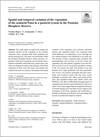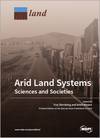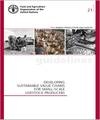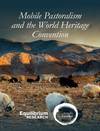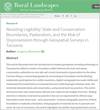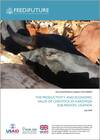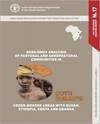This study aimed to analyze the spatial and temporal variation of the vegetation in the northern Argentine Puna, utilizing both field sampling and remote-sensing tools. The study was performed within the Pozuelos Biosphere Reserve (Jujuy Province, Argentina), which aims to generate socio-economic development compatible with biodiversity conservation.
Year of publication: 2019Organization: Auteurs individuels
Topic: Services environnementaux, Régime foncier
Language: English
Type of document: Scientifique
Geographical coverage: Amérique Latine
Through knowledge, documentation and evaluation, this book links academic disciplines to convey the complexities and possibilities existing across drylands. The chapters draw together a great variety of global drylands. Research explores the Gobi Desert and China, Central Asia and the Middle East, as well as multiple African dimensions and Latin America. The aim is to understand the essential themes that arid and semi-arid regions encounter and engage with today. This interdisciplinary study reflects the vital links between social and environmental science in global deserts. Using mixed methodologies and varied techniques, the original work stresses today’s topical themes to present novel analyses. The book offers much to dryland researchers, stakeholders and importantly, policy makers, who shape the world’s vast desert landscapes.
Year of publication: 2019Organization: Auteurs individuels
Topic: Régime foncier
Language: English
Type of document: Technique
Geographical coverage: Global
This publication constitutes a practical development tool, which implements the sustainable food value chain framework with a focus on small-scale livestock producers, targeting an audience of project design teams and policymakers. By integrating the concepts of value addition and the three dimensions of sustainability, the sustainable food value chain framework not only addresses questions concerning the competitiveness, inclusion and empowerment of small-scale producers, but also incorporates the cross-cutting issues that are increasingly embedded in development projects. These guidelines take the user through the different steps of value chain development, highlighting the particularities of the smallholder livestock sector, such as multi-functionality, specific production cycles or food safety issues, through concrete examples.
Year of publication: 2019Organization: Organisation des Nations Unies pour l'alimentation et l'agriculture (FAO)
Topic: Value addition
Language: English
Type of document: Technique
Geographical coverage: Global
The following paper is a report for Roads Less Travelled, a global partnership of DiversEarth, Yolda Initiative and Trashumancia y Naturaleza, which makes the case for mobile pastoralism (transhumance, nomadic and semi-nomadic pastoralism) at a global scale, through new research, support to pastoral communities, and through creative celebration of their knowledge and ways of life. This paper contributes to a stream of work by Roads Less Travelled on mobile pastoralists and protected areas.
Year of publication: 2019Organization: Auteurs individuels
Topic: Services environnementaux, Les savoirs autochtones
Language: English
Type of document: Technique
Geographical coverage: Global
This article illustrates how the introduction of modern geospatial surveying technology in Tanzania has failed to resolve a boundary conflict. The conflict exists between the state and nature conservation authorities on one side and a rural community of pastoralists on the other. The article shows how state and conservation officials have relied on the insights from fact-finding exercises to dismiss rural land use practices that are not represented in official maps. Pastoralists resist these state- and conservation-centered practices of fixed boundaries to maintain a historical, vital geography of seasonal access to pastures and water. In conclusion, this article highlights the pitfalls of geospatial land surveys and fact-finding exercises that unearth and lay bare a boundary conflict previously hidden from the state’s view. Through enhanced legibility, rural communities may become visible to the state, risking dispossession and evictions.
Year of publication: 2019Organization: Auteurs individuels
Topic: Conflit, Régime foncier
Language: English
Type of document: Technique
Geographical coverage: Afrique orientale
This report calculates the direct use value of livestock in Karamoja Sub-region, Uganda. The concept of direct use value pulls together under one heading all the various economic benefits derived from livestock. These include products such as milk, blood and meat; physical services such as the cultivation by animal traction of arable fields; and financial services such as livestock-based credit, insurance and risk management. In these calculations, goods and services that are not marketed are assigned monetary values that reflect their potential commercial value. This approach generates a comprehensive estimate of the economic benefits derived from livestock by livestock owners in Karamoja and provides an evidence-based assessment of the value of the sub-region’s livestock to the Ugandan national economy.
Year of publication: 2019Organization: Auteurs individuels, Agence des États-Unis pour le développement international
Topic: Économie, Services environnementaux, Sécurité alimentaire
Language: English
Type of document: Technique
Geographical coverage: Afrique orientale
“Strengthening the Livelihoods Resilience of Pastoral and Agropastoral Communities in South Sudan’s Cross-border Areas with Sudan, Ethiopia, Kenya and Uganda” is a three-year project funded by European Union that aims to improve governance and conflict prevention to reduce forced displacement and irregular migration in the cross-border areas of South Sudan. This publication is a baseline study and its main objective is to collect information on the indicators that will be used to estimate the impact of the cross-border project after its three year implementation. An additional objective is to gain a better understanding of the drivers of instability and irregular migration, as well as of the determinants of food security and resilience. The primary tool used in this study is the RIMA-II model developed by FAO. This report presents the results of the baseline survey; it is based on data collected by FAO and partners during July - August 2017 under the nationwide Food Security and Nutrition Monitoring Survey (FSNMS), triangulated with qualitative data from secondary sources.
Year of publication: 2019Organization: Organisation des Nations Unies pour l'alimentation et l'agriculture (FAO)
Topic: Conflit, Sécurité alimentaire, Résilience
Language: English
Type of document: Technique
Geographical coverage: Afrique orientale
This checklist seeks to provide companies with operational guidance on how to ensure due diligence when operating in areas where projects may affect indigenous peoples. Based on the United Nations Declaration on the Rights of Indigenous Peoples (UNDRIP) and ILO Convention No. 169, this Checklist aligns the principles and rights in these two instruments with the human rights due diligence approach set out in the UN Guiding Principles on Business and Human Rights. It outlines key questions business should consider in engagement with indigenous peoples and their communities.
Year of publication: 2019Organization: Auteurs individuels
Topic: Peuples autochtones
Language: English
Type of document: Technique
Geographical coverage: Global


